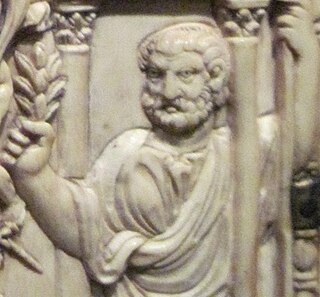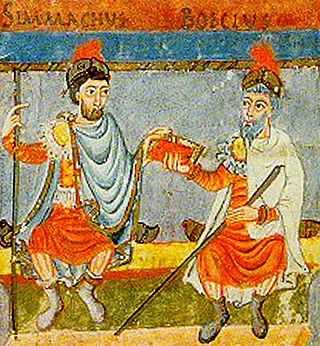Biography
A member of the aristocratic family of the Symmachi, he was the son of Aurelius Valerius Tullianus Symmachus, consul for 330. He had one daughter and four sons, among whom were Celsinus Titianus [1] and the most influential of the Symmachi, the orator Quintus Aurelius Symmachus. Avianius was among the senators who had not converted to Christianity and continued to practice the traditional state religion of Rome, [2] and was member of several priestly collegia, including the Pontefices Vestae and the quindecimviri sacris faciundi (from 351 to 375). [3]
By January 350 he held the office of praefectus annonae; later that decade he was vicarius urbis Romae. In 361, he went to Antioch (in Syria), where he probably met Libanius, to meet Emperor Constantius II: it is probable that the Roman Senate wanted to assure its loyalty to the ruling emperor after receiving a letter from Julian, cousin and caesar of Constantius, who had been just proclaimed emperor by his troops. On their way back, Symmachus and his colleague Valerius Maximus travelled through Nassus , where they were received by Julian with all the honours. [4] [5]
From April 364 to March 365 he held the office of praefectus urbi of Rome, under the rule of Valentinian I. As praefect, he restored the ancient pons Agrippae on the Tiber (on the place of the modern Ponte Sisto), [6] which took the name of pons Valentiniani; Symmachus even paid for a lavish public celebration for the inauguration of this bridge. Ammianus Marcellinus has a flattering opinion of his mandate. [7]
His house was on the right side of the Tiber, in Trastevere, and was burned down by the plebs during a riot in 367. [8] According to the story told by Ammianus, the riot originated from a rumour, diffused by a member of the plebs, according to which Symmachus, during his prefecture, had said that "he would prefer putting out the limekilns with his own wine, to selling the lime at the price expected of him"; forgetting the prosperity achieved during Symmachus' office, the enraged plebs burnt down his house. [7] [9] Symmachus left the city following this offence caused by "envy", [10] that he tried to heal by writing a literary work. [11] After a while, however, the plebs changed their minds and started supporting Symmachus, even asking for a punishment of the offenders. [12] Symmachus returned to Rome, by request of the Roman Senate, [13] whom he thanked on 1 January 376; the senators, even the Christians, proposed him to Emperor Gratian as praetorian prefect and consul for year 377. [2] [14]
Avianius Symmachus died in 376, as consul-elect. [15] The following year, his memory was honoured with a gilded statue, erected by imperial decree after a request of the Senate, on 29 April. [5]
Symmachus is a name from Roman antiquity. It may refer to:

The gens Valeria was a patrician family at ancient Rome, prominent from the very beginning of the Republic to the latest period of the Empire. Publius Valerius Poplicola was one of the consuls in 509 BC, the year that saw the overthrow of the Tarquins, and the members of his family were among the most celebrated statesmen and generals at the beginning of the Republic. Over the next ten centuries, few gentes produced as many distinguished men, and at every period the name of Valerius was constantly to be found in the lists of annual magistrates, and held in the highest honour. Several of the emperors claimed descent from the Valerii, whose name they bore as part of their official nomenclature.

Quintus Aurelius Symmachus signo Eusebius was a Roman statesman, orator, and man of letters. He held the offices of governor of proconsular Africa in 373, urban prefect of Rome in 384 and 385, and consul in 391. Symmachus sought to preserve the traditional religions of Rome at a time when the aristocracy was converting to Christianity, and led an unsuccessful delegation of protest against Emperor Gratian's order to remove the Altar of Victory from the curia, the principal meeting place of the Roman Senate in the Forum Romanum. Two years later he made a famous appeal to Gratian's successor, Valentinian II, in a dispatch that was rebutted by Ambrose, the bishop of Milan. Symmachus's career was temporarily derailed when he supported the short-lived usurper Magnus Maximus, but he was rehabilitated and three years later appointed consul. After the death of Theodosius I, he became an ally of Stilicho, the guardian of emperor Honorius. In collaboration with Stilicho he was able to restore some of the legislative powers of the Senate. Much of his writing has survived: nine books of letters; a collection of Relationes or official dispatches; and fragments of various orations.

The gens Aurelia was a plebeian family at ancient Rome, which flourished from the third century BC to the latest period of the Empire. The first of the Aurelian gens to obtain the consulship was Gaius Aurelius Cotta in 252 BC. From then to the end of the Republic, the Aurelii supplied many distinguished statesmen, before entering a period of relative obscurity under the early emperors. In the latter part of the first century, a family of the Aurelii rose to prominence, obtaining patrician status, and eventually the throne itself. A series of emperors belonged to this family, through birth or adoption, including Marcus Aurelius and the members of the Severan dynasty.

Quintus Aurelius Memmius Symmachus was a 6th-century Roman aristocrat, an historian and a supporter of Nicene Christianity. He was a patron of secular learning, and became the consul for the year 485. He supported Pope Symmachus in the schism over the Popes' election, and was executed with his son-in-law Boethius after being charged with treason.
Quintus Clodius Hermogenianus Olybrius was a Roman politician, praefectus urbi of Rome from 368 to 370 and Roman consul in 379. Olybrius has been characterized as belonging to "the breed of flexible politicians who did well both under Valentinian I [...] and under Gratian."
Vettius Agorius Praetextatus was a wealthy pagan aristocrat in the 4th-century Roman Empire, and a high priest in the cults of numerous gods. He served as the praetorian prefect at the court of Emperor Valentinian II in 384 until his death that same year.
Virius Nicomachus Flavianus was a grammarian, a historian and a politician of the Roman Empire.
Nicomachus Flavianus, sometimes referred to as Flavianus the Younger, was a grammarian and a politician of the Roman Empire. He was the son of Virius Nicomachus Flavianus. He held several offices under emperors Valentinian II (371–392), Theodosius I (379–395), Honorius (393–423), and Valentinian III (425–455); together with his father he supported the usurper Eugenius until his defeat and death (392–394). Flavianus also edited a corrected version of Livy's work.
Volusius Venustus was an aristocrat of the Roman Empire.
The Aurelii Symmachi were an aristocratic senatorial family (gens) of the late Roman Empire.
Aurelius Valerius Symmachus Tullianus was a Roman senator and aristocrat. He was appointed consul in 330 by the emperor Constantine.
Aconia Fabia Paulina was an aristocratic Roman woman, the daughter of Aconius Catullinus Philomatius, who was consul in 349. In 344 she married Vettius Agorius Praetextatus. Paulina was initiated into the Eleusinian mysteries and was a priestess of Hecate and of the Magna Mater.
The gens Anicia was a plebeian family at ancient Rome, mentioned first towards the end of the fourth century BC. The first of the Anicii to achieve prominence under the Republic was Lucius Anicius Gallus, who conducted the war against the Illyrians during the Third Macedonian War, in 168 BC.
Nonius Atticus was a politician of the Roman Empire.
Lucius Aradius Valerius ProculussignoPopulonius was a senator and a politician of the Roman Empire, twice praefectus urbi of Rome and once consul.
Aurelius Celsinus was a politician of the Roman Empire.
Maximus was a Roman politician.
This page is based on this
Wikipedia article Text is available under the
CC BY-SA 4.0 license; additional terms may apply.
Images, videos and audio are available under their respective licenses.



